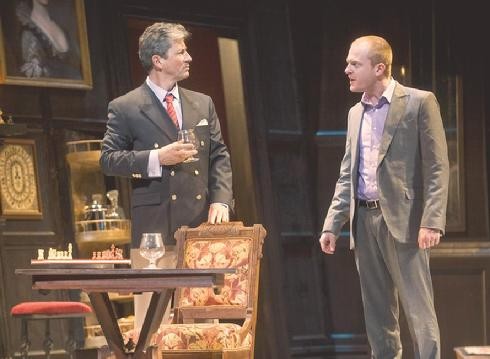Sleuth At Barrington Stage Company
A Mystery Hit for the Berkshires
By: Charles Giuliano - Jul 20, 2009
Sleuth
ByAnthony Shaffer
Directed by Jesse Berger
Scenic Design, David Barber; Costume Design, Clint Ramos; Lighting Design, Jeff Davis; Sound Design, Brad Berrige; Production Stage Manager, Lyndsey Goode; Press, Charlie Sidenburg; Starring Charles Shaughnessy (Andrew Wyke), Jeremy Bobb (Milo).
Barrington Stage Company
30 Union Street, Pittsfield 01201
Box Office, 413 236 8888
July 16 through August 1
An informal exit poll following the opening yesterday of "Sleuth," by Anthony Shaffer at Barrington Stage Company, confirms that the comic mystery play is another hit in what has proved to be a triumphant 15th year for the Pittsfield based theatre. Knock on wood, during these challenging times, Artistic Director, Julianne Boyd, has assembled a strong and compelling season.
Scheduling "Sleuth" is something of a no brainer. The 1970 play, which premiered in London, won a Tony Award for Best Play with a 1,222 performance run on Broadway. In various incarnations it has been seen on screen and stage directed by Kenneth Branagh, adapted and performed by Harold Pinter, and acted by Michael Caine, Jude Law and Sir Laurence Olivier.
The fact that the plot with its reversals, twists, and turns keeps an audience intrigued until the final gasp, a murder, or is it, proves to be a given. What remains to be said is how this production holds our attention. Absolutely.
The drama unfolds in the cozy Wilshire, England living quarters of the successful, handsome, and sophisticated mystery writer Andrew Wyke (Charles Shaughnessy). David Barber has created a manly, cluttered set all dark paneled walls strangely cantilevered, covered with ancestral paintings. There are book shelves with a trick that pulls out a wardrobe of costumes and props, the stuff of deadly games. Even the bar is concealed next to the great hearth. There is a staircase, which works its way into the plot that takes us to a balcony, window, and bedroom.
These are all the trapping of privilege and professional success. We first encounter Andrew in a smoking jacket, costumes by Clint Ramos, reciting the text of his latest smarmy mystery novel. Wyke has it all; a stately home, glamorous wife, Margaret, fast car, and mistress, Tea (pronounced Tay-a). But he is awaiting the arrival of Milo Tindle (Jeremy Bobb) who is taking something away from him, Margaret.
While charming Milo with a sophisticated patter and fine Scotch there is an edge as we learn that the lover of his wife is a man of common origin. Milo was born in Great Britain the son of an Italian immigrant who is half Jewish and fled fascism. After a failed business he returned to Italy after the war. Milo has fared somewhat but not a great deal better. He lives above his shop. This social and economic difference is the leverage for Andrew to mock and ridicule his rival as well as draw him into an ever more convoluted scheme.
Knowing that Margaret, whom we never meet, is used to a life of privilege, which Milo obviously cannot sustain, Andrew suggests a plan to have Milo break and enter to steal jewels in a safe. Milo will then fence the jewels to a connection of Andrew's for a good sum. Milo will have a nice nest egg to start a better life with Margaret. Andrew will recover the value of the jewels through an insurance claim. It seems a sporting proposition in which Andrew will be assured of being rid of an unfaithful wife while Milo will have the opportunity to support her in the manner to which she is accustomed.
As my mother used to say "Romance without finance ain't got no chance." While love conquers all cash helps. Milo takes the deal which spins into a game with deadly consequences. Perhaps, maybe not.
The first act culminates with Andrew seemingly having completely duped and humiliated his rival. Andrew has great fun in forcing Milo into a silly clown costume, with those awkward big shoes, and gotten him to break and enter. This gives Andrew the momentary upper hand of being able to murder with impunity a thief breaking and entering his home. Shots are fired and the first act ends with Milo tumbling down the stairs apparently dead. Or is he?
The second act begs that question and it would spoil the fun to reveal any more of the plot. Suffice it to say that there are several reversals as both men prove to be well matched in the pursuit of a deadly game. The police get involved. Or do they? The plot twists and turns its way around like a sports car racing along the Amalfi Coast in Hitchcock's "To Catch a Thief."
The performances by Shaughnessy and Bobb are spot on. There is a nice contrast between Andrew's patrician sophistication and arch skullduggery and Bobb's plain cloth survival skills. In some ways, very British, this is set as a class struggle. That aspect gets played down in an American production. Here we get a trade off of the matinee idol looks of Shaughnessy and Bobb, with a buzz cut, as more of a working stiff. Andrew is single malt Scotch while Milo is a six pack of Bud. But in this desperate duel they are so well matched that in a comic interlude Andrew suggests that they forget their differences, dump Margaret, and live together as they are so much alike. By then we have learned that Andrew is not much in the sack. In that sense the virile Milo has challenged his already fragile manhood. How British.


